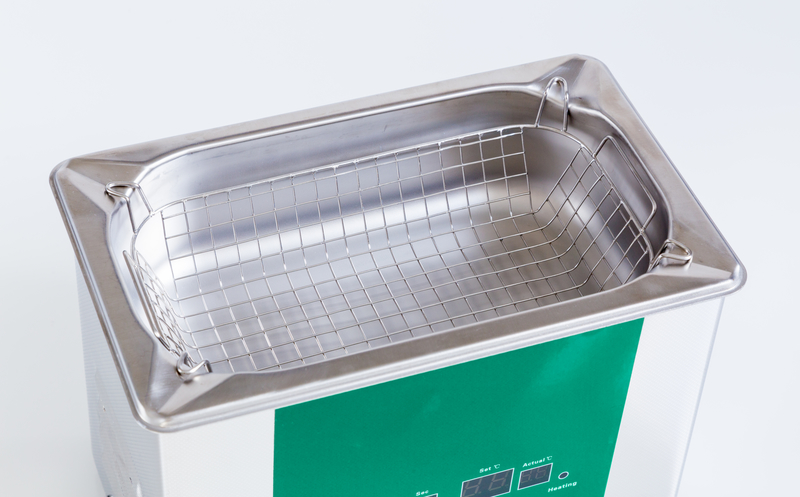How Does Ultrasonic
Cleaning Work?
How does ultrasonic cleaning work?
As a dentist, I think ultrasonic denture cleaners are the best way to keep dental appliances such as complete dentures, night guards and retainers hygienic. I also believe that it's important to use one of the best ultrasonic cleaners for your daily cleaning.
The good ones are EASILY the most effective way of making sure that your dentures are as clean as possible. And they are endorsed by the American Dental Association. The BEST units are the Branson ultrasonic cleaner and the iSonic ultrasonic cleaner.
READ ON TO FIND OUT MORE!
An ultrasonic unit is basically a small tub containing a liquid, (usually tap water - but the best liquid for ultrasonic cleaner is discussed further down on this page), which has high-frequency (ultrasonic frequency) sound waves projected through it. The ultrasound within the liquid causes tiny air bubbles to appear on a microscopic level, and collapse, very quickly, all through the liquid. In short, the ultrasonic energy generates microscopic bubbles
 ultrasonic denture cleaner
ultrasonic denture cleanerHow Does Ultrasonic
Cleaning Work?
This microscopic "bubbling" cleans the surfaces of anything placed in the tub, like the surface of the dentures. It's a small jacuzzi for your dental appliances and dentures! Studies using an electron microscope prove how effective a true ultrasonic cleaner can be at removing food particles and bacteria.
There are quite a few denture ultrasonic cleaners available. Some are designed specifically for dentures, while most are designed to be general purpose. The only thing special about the "denture-designed" ones is the size and shape of the stainless steel tank.
They are made just big enough to fit a set of dentures into, and tend to be oval in shape. However, I think that some of them are too small, and are not powerful enough to do a decent job. In addition, some manufacturers charge more for them just because they are a "medical device"! BUT they are not specialized medical devices, they are just an ultrasonic cleaning machine.
I have looked at A LOT of ultrasonic cleaners over my 30 years in dentistry, and I have selected JUST FOUR units that I think are the best available at the moment. I can recommend them wholeheartedly.
How Does Ultrasonic
Cleaning Work?
SmileDirectClub
I really like the ultrasonic cleaning unit from SmileDirectClub. It measures just over 6" high, and is quite compact to keep in your bathroom. It has a durable stainless steel reservoir, and a powerful ultrasonic generator.
It also uses ultra-violet light to kill bacteria. Although the makers claim you can use it with just plain water, it definitely works better if you use the SmileDirect Retainer Bright tablets in the water tank.
It operates at around 20,000Hz, which is lower than the other units listed here, but it works well. It also means the unit is not as loud!
Check it out at my Amazon link here.
iSonic Ultrasonic Cleaner
- iSonic F3900. This is a very compact device, and quite light, so it's great for travel.
The iSonic ultrasonic cleaner has a fixed 5-minute auto cycle, then it shuts down. It has a stainless steel tank and a plastic removable basket to put your complete dentures or partial dentures (false teeth) or retainers into. It is mains-powered, so needs to be plugged in to a wall socket.
Some people have reported being surprised by how loud it is, but in reality it's no louder than some sonic toothbrushes such as the Sonicare. The noise is mostly due to the frequency that it operates at, an ultrasonic frequency 42,000Hz.
Does this matter? The higher the frequency of the sound waves, the smaller and more penetrating the bubbles. So 42,000Hz is a relatively high frequency for an ultrasonic denture cleaner, and will penetrate into the tiniest spaces.
Here's a link to a YouTube video that gives a demonstration of the iSonic. The presenter is from an anti-snoring device company - it's not me! But I like the presentation.
How Does Ultrasonic
Cleaning Work?
Magnasonic ultrasonic cleaner
- Magnasonic. This operates at the same ultrasonic frequency as the iSonic above - 42,000Hz. This makes it just as efficient. Like the iSonic, it can operate with plain tap water, or you can use a denture cleaning solution. It has FIVE different cycles, ranging from 90 seconds to 480 seconds. It also has a stainless steel tank, but has a slightly bigger capacity than the iSonic.
I really like the Magnasonic, with it's bigger capacity tub. I think it offers the BEST value for money of all the ultrasonic denture cleaners here. Be sure to check it out at Amazon - I think you'll be impressed! This definitely one of the best denture cleaners available.
Just click on the image below to get the best deal at Amazon.
How Does Ultrasonic
Cleaning Work?
Generic SonicWave ultrasonic cleaner
- Generic SonicWave CD2800. At a lower price point than the first two devices, this also operates at 42,000Hz, and has a quality feel about it. The tub is made from stainless steel, and whole thing has a reassuring weight. It is powered by mains electricity, and has a 5-minute cycle with automatic shut-down. The tub has a one pint (16 fl.oz. capacity.)
The cleaning powder that is available with this device can be a little aggressive, however. Ultrasonic cleaning solutions are a point of controversy. I recommend using a drop of plain dish washer liquid.
Branson Ultrasonic Cleaner
- Branson 200. Digital ultrasonic cleaner. This is a more expensive option than the others above, at just over $100. However it is also bigger, with a more substantial build quality. The steel tank has thicker walls than the units already mentioned above, and so it will last longer. The ultrasonic waves DO corrode the walls of EVERY cleaner, and eventually the tank will perforate. The Branson B200 will last for years!
Also, the bigger tank size means that the ultrasonic waves can penetrate around your dentures better.
It uses a slightly lower frequency, at 40,000 Hz, but this is a very efficient ultrasonic vibration for cleaning dentures. It works very well at getting all types of dentures clean, and helps to prevent stain building up. It does a great job. This is the Rolls Royce option.
How Does Ultrasonic
Cleaning Work?
I think the the best one is definitely the Branson ultrasonic cleaner. If your budget can stretch to it, and you want the cleanest dentures, the Branson will give the most thorough cleaning, eliminating deep stains and tough stains. It will also last longer than any other cleaners I have seen, because it has the best construction quality. It has the best performance.
How do you clean dentures with an ultrasonic denture cleaner?
First of all, you need to give your dentures a GOOD basic clean, as I describe here in How To Whiten Dentures.
After you have cleaned your dentures with a brush, THEN you can put them in the ultrasonic tub. The dentures should be completely covered with water. It's important that no bits of the denture are sticking out above the water.
What is the best liquid for ultrasonic cleaner?
Some ultrasonic denture cleaners recommend dissolving one of their cleaning tablets in the water, too. The chemicals in these tablets can help the ultrasonic action to remove bacteria, but if you have scrubbed your dentures beforehand with a brush, I don't think that additional chemicals are really needed.
Now press the button to start the machine, and let it run through its cycle. This usually takes 5 minutes. After the machine has stopped, take your dentures out, rinse them well under the tap, and you're done!
It's important to remember that ultrasonic denture cleaners do not replace the need to scrub your dentures with a brush - they are an extra step in getting your dentures really clean. You have to do both!
For more information about looking after your dentures, go to Best Denture Products.




